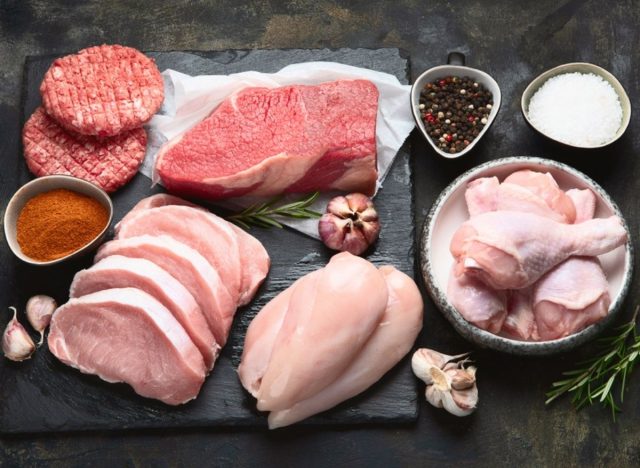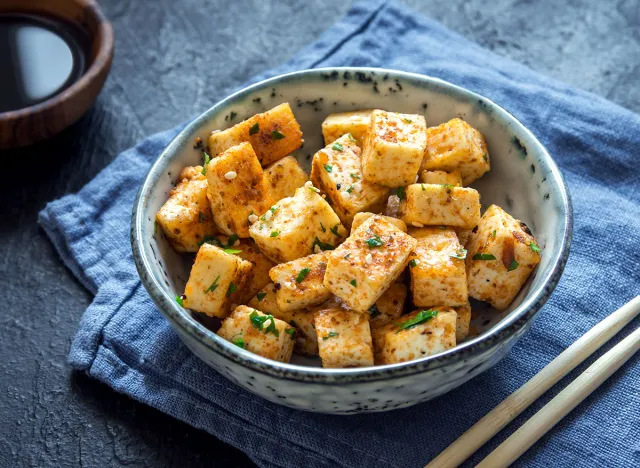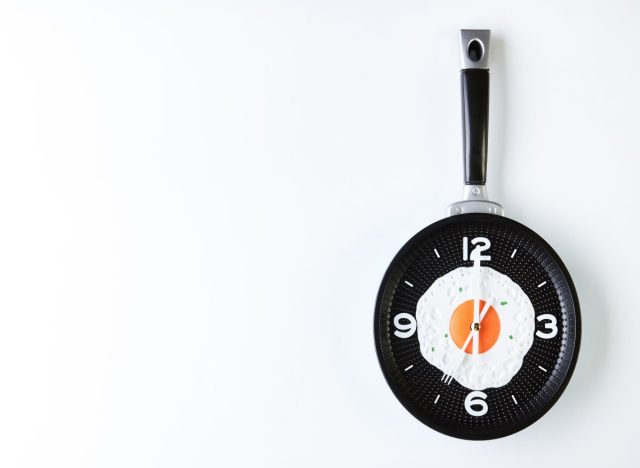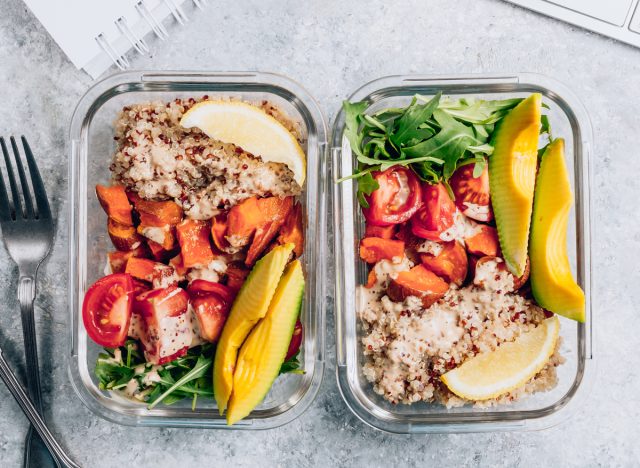Muscles develop with a combination of fitness, rest, and proper nutrition. When it comes to building stronger muscles, it's important to be cautious about how you workout and how you eat, as well as listening to your body. Muscles also develop gradually, so it's important to continue with habits that help your muscles consistently grow and get stronger.
Eating habits are important for remaining consistent when working towards your health benefits, with stronger muscles being no exception. If you don't know where to start, Lisa Moskovitz, RD, CEO of NY Nutrition Group and author of The Core 3 Healthy Eating Plan, gives some insights on the best eating habits for stronger muscles. After, for more, check out The Best Breakfast Recipes for Stronger Muscles, Says Dietitian.

"Protein is an essential macronutrient that acts as the gateway to tissue repair, recovery, and growth," says Moskovitz. "Consuming a sufficient amount of protein is paramount for muscle growth potential."
Usually, the Recommended Dietary Allowance (RDA) for protein is 0.8 grams of protein per kilogram of body weight, which is about 2.2 pounds.
However, Moskovitz suggests figuring out your protein needs with a registered dietitian who can base the amount of protein consumed off of your body's specific demands and activity level. Typically, she recommends consuming at least half your weight in grams. For example, if you weigh 150 pounds, that's 75 grams of protein per day. This is a good starting point, but not a rule of thumb.
Looking for more advice on how much protein to eat? Moskovitz's book, The Core 3 Healthy Eating Plan, provides a formula that helps you figure out how much protein to consume and the best sources for optimal muscle growth and preservation.

If protein sources are "complete" it contains all nine essential amino acids.
"While you don't have to eat animal proteins to hit your daily protein quota, not all plant proteins are complete, which means they don't contain all 9 essential amino acids necessary for muscle growth stimulation," says Moskovitz. "If you're relying mostly on plant-based proteins, make sure you incorporate enough variety to improve amino acid absorption."
For example, brown rice on its own is not complete. However, if you add red kidney beans, they supply the missing amino acids to make it complete. Although you do not need to eat them together, it is important to consume enough throughout the day. Complete plant proteins to consider prioritizing include tofu, edamame, chickpeas, pistachios, and quinoa.

Yes, it is important to consume enough protein by the end of the day. However, it is also helpful to space it out throughout the day so it's not consumed all at once.
"Protein-rich foods are not always as convenient as fats and carbs may be," says Moskovitz. "However, our bodies are in a constant state of nitrogen depletion and if you don't consume a steady source of protein it can be hard to maintain a balance to prevent muscle breakdown."
Moskovitz suggests eating at least a source of protein (at least 15 grams) at each meal. This can protect catabolism—the breakdown of complex molecules (such as proteins) to form simpler ones, together with the release of energy. It can also improve muscle growth rate.
"This is especially true for those with a more active lifestyle," says Moskotvitz. "Add eggs or lox to your toast in the morning, toss in tofu, beans, chicken, or salmon in your salad at lunch, and even consider snacking on protein-rich foods such as Greek yogurt, nuts, edamame, hard-boiled eggs, cheese, or tolerated protein bars."

Although protein is an important part of developing muscles, it is not the only key macronutrient.
"When putting together meals, don't forget about carbs and fats," says Moskovitz. "Carbs provide the quickest source of fuel for weight-training workouts, and anti-inflammatory fats help with the nutrient absorption and hormone production required to build muscle. Try to include all three macros at every meal as much as possible for a balanced meal."
The Mayo Clinic even suggests that during a workout, carbohydrates fuel your brain and muscles. So, for the average light-intensity workout, eat about 3 to 5 grams of carbohydrates for every kilogram of body weight.

"Drinking alcohol is a personal choice and often a part of enjoying life. However, excess alcohol consumption impairs certain hormone production, such as testosterone, that directly affects muscle protein synthesis," says Moskovitz.
According to the Cleveland Clinic, alcohol can affect muscles in a way that prevents success or development. Heavy drinking can also lead to a poor diet which means your muscles are using empty calories from alcohol rather than healthy foods.
With that being said, if muscle growth and increasing strength is a priority, it's best to drink in moderation, which is one drink a day for women and two drinks a day for men.
Best Eating Habits for Stronger Muscles, Says Dietitian — Eat This Not That - Eat This, Not That
Read More


No comments:
Post a Comment